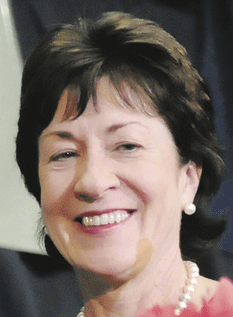U.S. Sen. Olympia Snowe wants presidential candidate Mitt Romney to repudiate the Republican Party’s strict anti-abortion platform when he gives his national convention speech this week.
U.S. Sen. Susan Collins said the platform “seems designed to alienate” some women and creates division about an issue that was settled years ago.
The public criticism from Maine’s Republican senators came on the eve of the GOP’s national convention in Tampa and in the wake of controversial comments by U.S. Rep. Todd Akin, R-Missouri, that focused attention on the party’s official anti-abortion platform, even in cases of rape.
Akin, who is running for a Senate seat, drew fire from Romney, party leaders and others for saying in a TV interview that the female body has a way of preventing pregnancy in cases of “legitimate rape.”
Snowe and Collins are pro-choice and among the most moderate Republicans in Congress. Snowe, who will retire from the Senate at the end of this year, wrote a column that ran in The Washington Post on Friday, saying Romney and the GOP must rebuild the party’s relationship with women or lose the election in November.
“This is not where I hoped my party would be in 2012,” Snowe wrote. “First and foremost, Romney should vigorously, not timidly, disassociate himself from the extremes within our party by reiterating to the national audience that the overly rigid language on abortion in the GOP platform — which includes no explicit exceptions for cases of rape, incest or danger to the life of the mother — does not represent his view, nor has it been his position. … In doing so, he will demonstrate that he can strongly stand up to those with whom he disagrees, even within his party.”
Romney was a pro-choice governor and U.S. Senate candidate in Massachusetts, but he now says he opposes access to abortion except in cases of rape, incest or danger to the health and life of the mother. Interviewed by CBS News on Monday, Romney tried to quell the controversy before the convention.
“The Democrats try and make this a political issue every four years, but this is a matter in the courts. It’s been settled for some time in the courts,” Romney told CBS.
However, it’s not just Democrats criticizing the party’s platform. Both Snowe and Collins were critical of their party in a Newsweek article posted Monday on The Daily Beast website.
“It seems like we’ve been thrown back decades into debates most everyday people think were settled years ago,” Collins told Newsweek. “This doesn’t mean we’re disrespectful to people who hold a different point of view, but the platform seems designed to alienate a lot of moderate women. I don’t get it.”
Collins said the party’s official stand may appeal to the conservative base, but it makes it hard to win votes in moderate states such as Maine.
Snowe told the magazine that Romney should reassure women and get the discussion back to the economy.
“Social issues are the Achilles’ heel of our party, but the economy is the Achilles’ heel of the Obama administration,” Snowe said.
Snowe noted that Romney had been gaining ground with female voters before the Akin controversy. Polls showed that Obama’s lead among female voters dropped from 20 percentage points or more to as little as 8 points, she wrote.
A poll of Maine voters, conducted for The Portland Press Herald in late June, showed that Obama had a 25 percentage-point lead among women and a 2-point lead among men.
Romney probably will try to reassure female voters and distance himself from the party’s platform, but probably not in his convention speech, said Michael Franz, associate professor of government at Bowdoin College in Brunswick.
“The convention will probably be dominated by the people who think the exact opposite of (Snowe and Collins),” he said. “He doesn’t want to do this in the belly of the beast. He wants to do this in front of sympathetic audiences.”
Romney has spent the past year working to convince conservatives that he no longer favors abortion rights. He’s not likely to raise new doubts at the convention, Franz said. “Romney has to walk a fine line.”
The tension is nothing new for Republican conventions and presidential candidates, Franz pointed out.
“Republican candidates have been trying to walk that line since probably Bob Dole in 1996, if not before,” he said. “Ever since then, it’s been kind of an issue at Republican conventions.”
Send questions/comments to the editors.




Comments are no longer available on this story